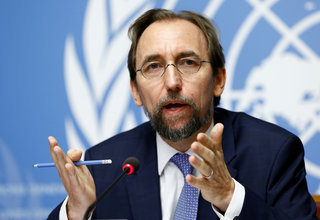
United Nations High Commissioner for Human Rights Zeid Ra'ad Al Hussein. (Reuters Photo/Denis Balibouse)
http://jakartaglobe.id/news/un-rights-chief-hopes-tolerance-will-prevail-indonesia-despite-deep-human-rights-issues/
By Sheany on 9:30 am Feb 08, 2018
_
Jakarta. The United Nations' human rights chief urged the government of Indonesia to address unresolved cases of past human rights violations and halt the death penalty, after a three-day visit to the archipelago this week.
During a press conference in Jakarta on Wednesday (07/02), Zeid Ra’ad Al Hussein touched on several critical issues concerning human rights in Indonesia, including blasphemy law, capital punishment and persistent gaps in the protection of economic and social rights of Indonesians.
"I have expressed to the government my concerns about the implementation of the ill-defined blasphemy law, which has been used to convict members of minority religious or faith groups," Zeid said.
Zeid stressed the importance of a fair judicial process for everyone, especially in dealing with drug-related crimes, and highlighted that capital punishment is an ineffective deterrent that usually targets already disadvantaged communities.
"Shooting dead suspected drug offenders is not the way to tackle this problem. Everyone has the right to a fair judicial process," Zeid said.
Zeid began his visit on Monday at the invitation of the Indonesian government. He has held meetings with the country’s top officials, including President Joko "Jokowi" Widodo, and representatives of civil society and the country’s national human rights institutions.
"I urge the Indonesian government to take steps toward accountability for gross human rights violations of the past," Zeid said.
He noted that Indonesia is still struggling to reckon with the terrible events of the past, including the 1965 anti-communist pogrom that killed at least 500,000 people, and said it is crucial to bring the perpetrators to justice and provide victims with long-overdue redress.
During the 2014 election campaign, Jokowi promised to resolve past violations of human rights, including rapes and killings during the May 1998 riots and the 1965-66 anti-communist mass killings. Evidently, those promises have yet to be realized.
According to Zeid, if Indonesia were to follow through in resolving past cases of human rights abuses, it could become a positive role model for other countries struggling to deal with their own dark past.
Zeid also urged the House of Representatives to pass the bills on recognition and protection of rights of indigenous people and protection for victims of sexual and gender-based violence.
He noted that despite continuous economic growth, many Indonesians have yet to benefit from the dividends, alluding to reports of farmers, workers and indigenous communities losing control over their land and natural resources to mining and logging by large corporations.
"There is a clear need for inclusive dialogue and consultation, and such projects must not be undertaken without the free, fair and informed consent of the affected communities," Zeid said.
On the draft revisions of the criminal code, which have attracted protests from human rights organizations and ordinary Indonesians, Zeid said the proposed amendments are "inherently discriminatory" and rebuked the appeal to local culture on which the argument was supposedly based.
The UN envoy expressed his deep concerns with extremist views playing out in the Indonesian political scene, and observed that there have been rising "strains of intolerance" across the archipelago.
Despite "dark clouds on the horizon," Zeid ended his remarks at the press conference on a positive note, expressing his beliefs that Indonesia will be able to survive the waves of intolerance that seem to have clouded the country’s long-standing reputation.
"I am encouraged by the positive momentum and hope common sense and strong traditions of tolerance of the Indonesian people will prevail over populism and political opportunism," Zeid said.
